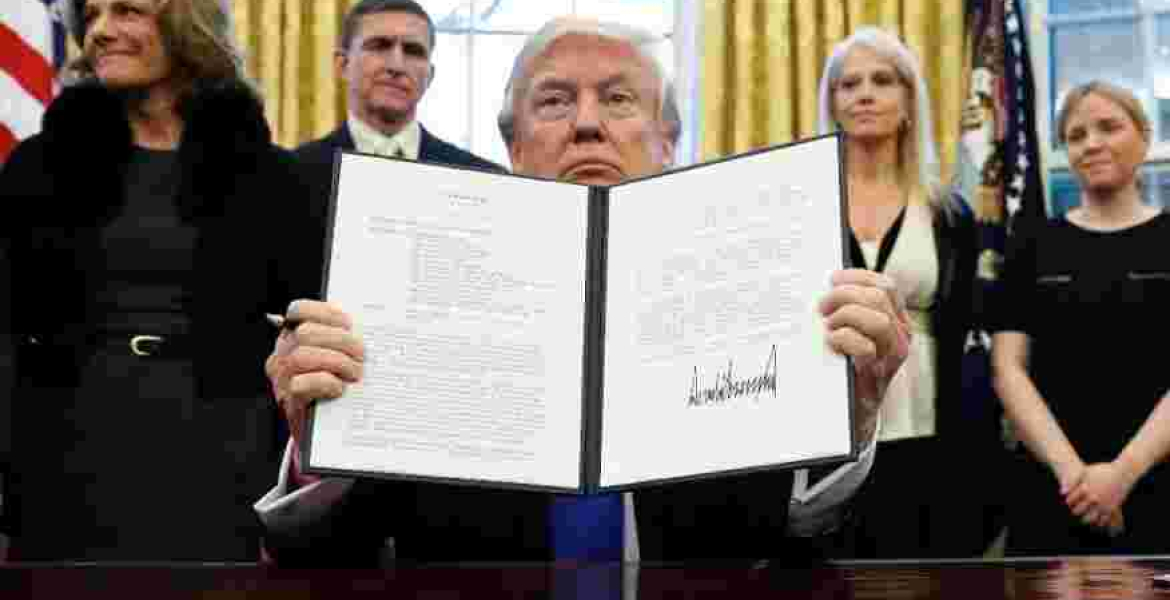
- 463 views
(AP) President Donald Trump is considering a new order to replace his soon-to-expire travel ban on people from six Muslim-majority countries that would be tailored on a country-by-country basis to protect the United States from attacks, U.S. officials said on Friday.
With the current ban on people from Iran, Libya, Somalia, Sudan, Syria and Yemen due to expire on Sunday, Trump was given recommendations by Elaine Duke, the acting homeland security secretary, but has not yet made a decision on the details of any new order, the officials told reporters.
Miles Taylor, counselor to Duke, said she recommended to Trump “actions that are tough and that are tailored, including travel restrictions and enhanced screening for certain countries.” Taylor declined to say which or how many countries would be targeted, including the status of the six countries covered by the current ban.
White House spokesman Raj Shah said that while “we can’t get into decision-making,” the next step will be a presidential proclamation setting out the new policy. He declined to say when that would come, including whether the president would act before the existing ban expires.
Trump’s six-nation travel ban was laid out in a March 6 executive order that was blocked by federal courts before being allowed to go into effect with some limits by the U.S. Supreme Court in June.
The March travel ban and an earlier January one that targeted the same six countries as well as Iraq are some of the most controversial actions taken by Trump since assuming office in January.
Critics have called the policy an unlawful “Muslim ban,” accusing the Republican president of discriminating against Muslims in violation of constitutional guarantees of religious liberty and equal protection under the law, breaking existing U.S. immigration law, and stoking religious hatred.
Trump has defended the travel ban and has promised that “radical Islamic terrorism” will be “eradicated.”
The legal question of whether the existing ban discriminates against Muslims in violation of the U.S. Constitution, as lower courts previously ruled, will be argued before the Supreme Court on Oct. 10. Officials declined to say how the proposed change in policy could affect the upcoming Supreme Court case.
The expiring ban blocked entry into the United States by people from the six countries and locked out most aspiring refugees for 120 days to give Trump’s administration time to conduct a worldwide review of U.S. vetting procedures for foreign visitors. The existing refugee ban expires on Oct. 24.
Under the recommendations Trump is weighing, there would be restrictions on U.S. entry that differ by nation, based on cooperation with American security mandates, the threat the United States believes each country presents and other variables, Taylor said. He did not give details on the nature of the restrictions, but said that after being imposed they could be lifted “if conditions change.”
Taylor said American officials in July notified every foreign government of requirements for the minimum cooperation the United States needs to validate traveler identities to ensure they do not represent a national security threat. Those countries were given 50 days to respond.
People from countries that did not meet the requirements may not be allowed to enter the United States or may face other travel restrictions, Taylor said. Most countries met those requirements or agreed to work toward meeting them, Taylor added.
“At the end of the day, some countries were still unable or, worse yet, deliberately unwilling to comply with the new baseline that we laid out,” Taylor said.
Trump, who promised as a candidate to impose “a total and complete shutdown of Muslims entering the United States,” said the soon-to-expire ban was needed to protect the United States from terrorism.
”We need to know who is coming into our country,“ Taylor said. ”We should be able to validate their identities and we should be able to confirm that our foreign partners do not have information suggesting such individuals may represent a threat to the United States.
The March order was intended to address legal issues raised by Trump’s January order, which caused chaos at airports worldwide and prompted protests in major U.S. cities and airports. States, including Hawaii; the American Civil Liberties Union; and refugee resettlement agencies challenged the March order in court.
On Sept. 15, Trump wrote on Twitter, “The travel ban into the United States should be far larger, tougher and more specific-but stupidly, that would not be politically correct!”
The March order took effect on June 26 after the Supreme Court allowed the ban to go into effect for “foreign nationals who lack any bona fide relationship with a person or entity in the United States.”
